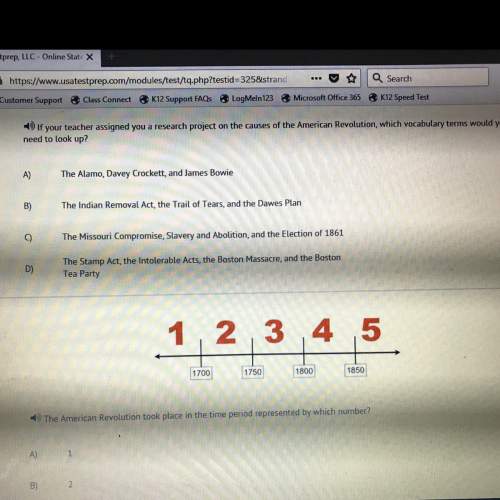
History, 28.10.2020 22:50 sleepyflower10
1: The problem. After the Revolutionary War, Congress faced enormous debt. The United States owedmoney to the French, who had helped to support the war. Money also was owed to American citizens whohad bought bonds from the government to help support the war. The total debt was so steep that someAmericans recommended simply not paying it back. They argued that, since the war bonds had changedhands several times, payment now would not go to the people who originally helped to support the war;instead, it would go to speculators who had purchased the bonds from the original bond holders. Underthe Articles of Confederation, moreover, Congress had no power to tax and thus no way to raise money touse in paying off war debts.
Predicting consequences. You are a member of the Congress of Confederation (the new name for theContinental Congress) in 1781, considering the issue of war debts. Predict the consequences likely to followif war debts are not repaid. Explain your prediction briefly, making use of the economic principle that people respond to incentives in predictable ways.
2: The problem. Under the Articles of Confederation, Congress had no power to tax. It could levy a tax only if the revenue it raised were turned back to the states on the basis of each state’s population. In other words, the U. S. government was severely restricted in its capacity to handle debts and expenses. Even if it seemed prudent to repay war debts, therefore, Congress in 1781 had no obvious means of raising the revenue that would be needed for repayment.
Predicting consequences. You are a member of the Congress of Confederation, considering whether the federal government should be granted new powers to tax. Predict the consequences likely to follow if Congress gains no new power to tax. Explain your prediction by reference to the economic principle that people respond to incentives in predictable ways.
3: The problem. Under the Articles of Confederation, the federal government had little power, but the states were empowered to act independently, as sovereign bodies. In matters of trade, they could pursue their self-interest even at the expense of neighboring states. Thus it seemed likely that tariff wars would erupt, pitting states against states. For example, New York imposed a fee on vessels traveling to and from Connecticut and New Jersey. Not to be outdone, New Jersey imposed its own tax on a New York owned lighthouse on New Jersey soil. New Jersey, lying between New York City and Philadelphia, found its imports heavily taxed. Leaders in other states watched attentively and considered placing their own taxes on products from neighboring states.
Predicting consequences. You are a member of the Congress of Confederation, considering whether Congress, rather than the several states, should be authorized to regulate interstate commerce. Predict the consequences likely to follow if the several states retain exclusive authority to govern interstate commerce. Explain your prediction by reference to the economic principle that people gain when they trade voluntarily.
4: The problem. Although America won the Revolutionary War, Britain continued to occupy territories
in the Great Lakes region, in open violation the Treaty of Paris. British occupation interfered with
Americans who sought to develop the Northwest Territory for settlement and trade. At the same time,
Spain refused to grant Americans navigation rights on parts of the Mississippi River; and in parts of the
Mediterranean Sea, Barbary pirates were attacking American shipping. Pockets of civil unrest — the
armed rebellion of poor Massachusetts farmers led by Daniel Shays in 1786, for example — also threatened
the peace in some places at home. Having separated themselves from the British Empire,
Americans now faced the need to provide for their own security in these cases. Under the Articles of
Confederation, however, the federal government had no means to provide for Americans’ defense and
security.
Predicting consequences. You are a member of the Congress of Confederation, considering whether
the federal government should be authorized to develop a strong military force to provide for Americans’
defense and security. Predict the consequences likely to follow if no such authority is granted. Explain
your prediction by reference to the economic principle that people gain when they trade voluntarily.
Due Today!!

Answers: 2


Another question on History

History, 21.06.2019 19:30
Are there any english colleges in south korea for americans that is international ?
Answers: 1

History, 21.06.2019 20:30
Match each treaty with its description. treatys- a the munich agreement b the pact of steel c the molotov-ribbentrop pact descriptions- 1- an alliance between germany and italy 2- an agreement between germany and the soviets dividing eastern europe 3-an agreement between germany, france, italy, and britain granting germany a small part of czechoslovakia in return for peace
Answers: 1

History, 22.06.2019 03:00
The quote below is an excerpt from the charter of the united nations: "the purposes of the united nations are: to maintain international peace and security, and to that end: to take effective collective measures for the prevention and removal of threats to the peace, and for the suppression of acts of aggression or other breaches of the peace, and to bring about by peaceful means, and in conformity with the principles of justice and international law, adjustment or settlement of international disputes or situations which might lead to a breach of the peace . " source:this section implies that the united nations is prepared to do what to keep world peace?
Answers: 1

History, 22.06.2019 03:30
Which economic sector employs the least number of people in mexico, barbados, and venezuela? a. agriculture b. services c. industry
Answers: 2
You know the right answer?
1: The problem. After the Revolutionary War, Congress faced enormous debt. The United States owedmon...
Questions

English, 21.09.2019 10:30



Health, 21.09.2019 10:30



Mathematics, 21.09.2019 10:30

Health, 21.09.2019 10:30



English, 21.09.2019 10:30

Computers and Technology, 21.09.2019 10:30


Chemistry, 21.09.2019 10:30

Spanish, 21.09.2019 10:30

English, 21.09.2019 10:30




English, 21.09.2019 10:30




